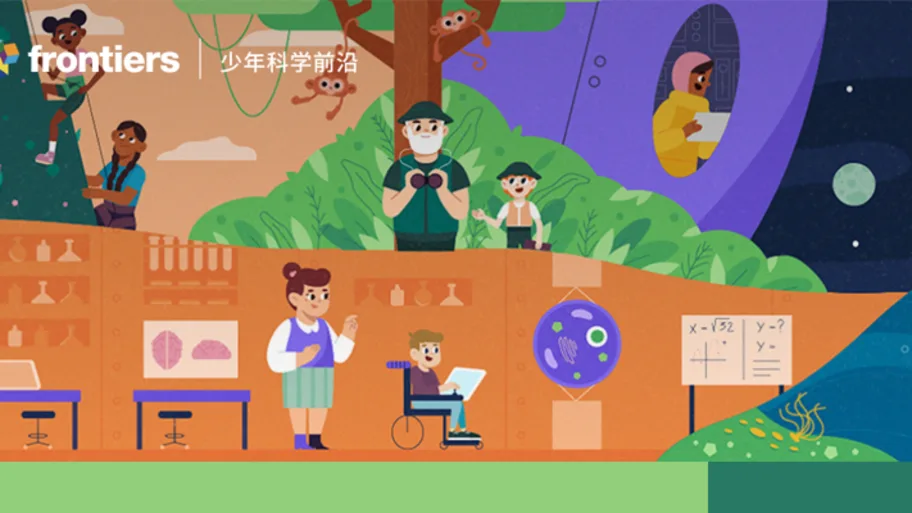
- Science News
- Frontiers news
- Frontiers launches social networking for scientists
Frontiers launches social networking for scientists
Today is quite a monumental and exciting day in the short history of Frontiers. The social networking platform for researchers was launched.
So far Frontiers has been publishing high-quality, peer-reviewed scientific research articles freely accessible to anybody in the world. In the 4 years of existence, Frontiers became the fastest-growing open-access publisher world-wide, with over 3 million monthly page views and over 5 millions article views and downloads. This tremendous success is due to the strong rooting in the scientific communities. Frontiers was founded by scientists and is run by scientists. With over 25,000 world-renowned scientists on the Frontiers editorial boards and almost 50,000 high-profile academic users, Frontiers is deeply rooted in the scientific community. The Frontiers users are mainly successful and famous scientists, are opinionated, they publish articles, participate in the peer-review and provide constant and enthusiastic feedback about what features should be improved or added. Frontiers has always been and will always remain a grass-roots initiative, serving the scientific communities.Thus, it only came naturally to expand the Frontiers platform from open-access publishing toscientific social networking. Today we launched the Frontiers Research Network, a social networking platform for scientists, researchers, academics and anybody whose mind is eager to know about the latest scientific discoveries and whose heart gets excited over our scientific heroes. Frontiers articles are all open-access, this naturally translates into a wider dissemination and greater readership than in most subscription publications, where the reader (or their library) has to pay to access the paper. However, we kept asking how else to increase the visibility of the articles and the scientists who publish them. The answer was so obviously web 2.0: social networking.
The world already has Facebook and LinkedIn and many other social networks, why do we need yet another network for scientists? Well, let me tell you my personal experience. I posted some of my publications and media articles on autism onto my Facebook wall and while I befriend some scientists, the result was usually a few likes and an occasional somewhat bewildered, yet well-meaning “While I don’t understand what this is about, it certainly sounds great, keep it up”. But oh boy, the moment I post a completely meaningless (in my scientific mind) status update on boarding a plane to wherever, the world reacts and interacts. And the reactions truly explode once a baby picture goes up – I love it by the way, Facebook is great to stay in touch with the people of your past and present. But it is not suited to represent my scientific self. It has not helped me to get into a meaningful interaction with other scientists. Many scientists we interviewed feel the same. In fact, some of the “older generation” (usually somewhere over 35 – excuse my manners, but on the internet this is very, very old…), still feel quite awkward on Facebook. Most of us scientists have already joined, after all 800 million users have a powerful drag effect, but quite a few are still reserved about the usefulness of it all – because in our very essence we are scientists and academics, we are interested in “meaningful” and complex stories and research results and discussions. While sometimes entertained, we usually get intellectually offended by the trivialities we encounter on Facebook. On LinkedIn, the social network for professionals, the experience is also not ideal: where shall I put up my papers, nobody there is really interested in them either. And then, if one is not directly connected to a person, one cannot see their profile and their achievements. That is not in the interest of a scientist. Our scientific life is public, the more people know about the conferences we organize and the papers we write the better for our scientific impact and our careers.Let me come back to my personal experience: I connected the very same papers, videos and media stuff to my profile on Frontiers. Within days they got 100s of hits and downloads, within a month it went into the 1000s for some of the content (by the way – you can monitor your impact in real-time on Frontiers). Another scientist posted a video lecture about his research on YouTube and then as well on Frontiers. On YouTube this lecture passed almost unnoticed (less than 100 hits), because YouTube is too mainstream, people there are interested in funny our outrageous videos – the total opposite of scientific lectures. On Frontiers, on the other hand, this video lecture got more than 4000 hits within two weeks, still counting. Clearly there is an audience quite hungry for this type of scientific content, but the audience is too dispersed on Facebook, YouTube or LinkedIn, people go there with something else entirely on their mind. This is the reason why we at Frontiers saw a value in building a specialized community platform and social network just for us scientists and like-minded fellows.
Now with the Frontiers social networking platform, the papers scientists publish and other content they post can be liked (so Facebook), commented on and shared with colleagues, both within Frontiers as well with other networking platforms such as Facebook, LinkedIn or Twitter. Most importantly, people can start following your research updates on Frontiers, without having to befriend you or requesting your approval. This means that every publication you publish on Frontiers or post from elsewhere will be automatically distributed to your “Followers”. It is in our interest as researchers to have our papers read by as many colleagues as possible. This is the main goal of publishing your article in an open-access journal and it is the goal of linking a social networking platform to these open-access articles. Today’s technology makes it possible to facilitate this broad dissemination of research results and promote our scientific heroes.
So, these are the social networking features that Frontiers released today – we hope you will have fun with them and that they will serve your interests.
· Follow researchers – you can now follow the research activity of your colleagues, friends or scientific heroes, this means:
· Receive article updates from your network – you will get automatic updates in your Frontiers activity stream whenever anybody you follow publishes a paper in a Frontiers journal or posts a publication from elsewhere to their profile.
· Receive other useful updates from your network – you will also get automatic updates in your Frontiers activity stream whenever somebody you follow posts an event, blog,image, video or news on Frontiers.
· Disseminate your research – likewise, whenever you publish or post something, people who follow your research updates will receive a feed in their activity streams on Frontiers.
· Like, Comment & Share – you can now like and comment on any type of content on Frontiers, you can share it with people on Frontiers or your networks on Facebook, Twitter and LinkedIn.
· Receive recommendations – you will receive useful recommendations for articles, news and blogs to read, conferences and events to attend and groups to join.
· Invite people – invite your colleagues and friends to Frontiers via email, check out who of your friends is already on Frontiers via Facebook, Twitter or LinkedIn.
By the way, these community features were already around for a while on Frontiers, but now they are improved quite a bit.
· Impact – you receive a detailed real-time impact analysis of any type of content that is linked to your profile. In your Frontiers account, you can monitor the hits and more sophisticated demographic analysis on your profile, articles, blog posts, images, videos or news (literally anything that you decide to post on Frontiers). More and more researchers are using this type of impact analysis in applications and to advance their careers.
· Automatic publication suggestions – Frontiers crawls all your publications for you. All you need to do is to verify and confirm them. Once you confirm, the impact analysis starts.
· Events – you can organize conference and other events on Frontiers. You can even organize the entire abstract review and publication of your conference on Frontiers.
Enjoy the social networking – it is quite an experience to see how your research propagates around the globe, both emotionally and intellectually. We hope that Frontiers will help you to foster collaborations and discussions. And as always: let us know your feedback!






